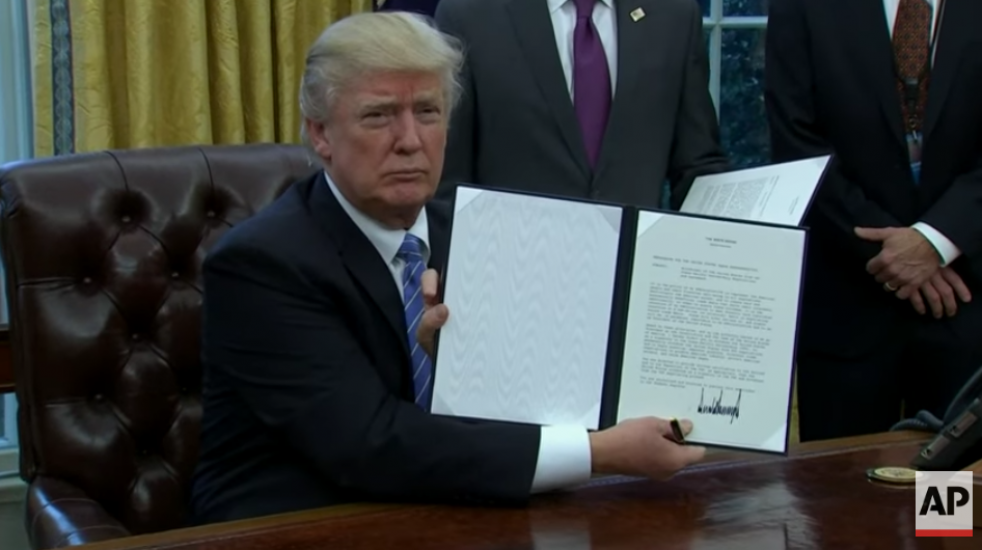President Donald Trump kicked off his first 100 days this week putting pen to paper to deliver on his promise to bring jobs back to America with the crux of his focus on manufacturing jobs.
As the work week comes to a close we decided to take a look at four things President Trump did to address these jobs and identify some of the long-term solutions.
Trump meets with chief executives of the big three U.S. auto companies.
What this means: As a way to help convince executives to create long-term jobs and production in the U.S., Trump promised a new climate for business, moving from one that he termed “very inhospitable to extremely hospitable.” Later in the day, he signed an executive order to streamline the regulatory approval process for new domestic manufacturing operations.
What will this mean for workers? In order for auto companies to invest millions domestically to build new assembly plants in a market that has peaked, they will have to make up for the costs by investing in automation to increase productivity and cut payrolls, meaning less workers. And those workers who are brought on will need a new set of skills to work with, maintain and troubleshoot their robot co-workers.
While this increase in automation has left an employment gap of skilled workers, some auto companies, like Toyota, are taking the initiative to work with local schools to re-design education to fill millions of highly-technical jobs with people able to do them.
In our piece, FutureWork: Model of the Future, Academy Award-winning filmmaker Barbara Kopple looked at how Toyota recreated secondary schooling in Georgetown, Kentucky, from the ground up to create the perfect employees for their specialized needs.
This is the model of employment that manufacturing companies will need implement, and Trump should encourage, if we want to not only increase these types of jobs in the U.S., but make it successful not only for the companies but for workers as well.
Trump signs executive order pulling out of the Trans-Pacific Partnership (TPP).
What this means: Donald Trump formally abandoned a 12-nation trade pact this week and declared an end to the era of multinational trade agreements. Trump said the move would help strengthen American workers stance against competition from low-wage countries.
Solutions to globalization: No matter what Trump does regarding trade deals to deter businesses from outsourcing jobs, workers will still be at risk because of automation and technology. According to a recent Oxford University study, as many as 47 percent of all jobs are likely to be eliminated by technology within the next 20 years.
But it isn’t all doom and gloom. While technology and automation will replace some jobs, it will also open up new jobs, but they will require workers learn a new set of skills.
By helping corporations with skills development, retraining programs, college and vocational credits, internships, and other forms of support, educational institutions and organizations like Year Up, College for Social Innovation, Operation Hope, AmeriCorps, and Service Year Alliance can help fill the millions of open good-paying jobs.
Trump signs executive order putting a freeze on federal hiring, excluding military workers.
What this means: Trump’s order put in place a 90-day hiring freeze for all new and existing federal personnel positions except for those in national security, public safety and the military. However, a lack of clarity in the memorandum has made determining which departments it affects, and whether or not seasonal workers are lumped into the freeze, difficult. We do know that is that those affected include civilian personnel and employees within the Department of Veterans Affairs.
During the freeze, Trump is expecting the Office of Management and Budget “to come up with a long-term plan to shrink the federal workforce through attrition.” Trump made it known throughout his campaign that he wants to see a more effective use of taxpayers’ money when it comes to federal agencies.
What are your options? As federal employees wait to determine whether or not their job is determined to be essential, there are many expanding fields that help the public that could be an option.
Health care is one area seeing major growth and long-term employment opportunities right now. One hospital network that we have featured here at WorkingNation is Carolinas HealthCare System for their new approach to hiring and training. Carolinas has seen great success focusing their efforts in recruiting and training five generations of employees including veterans. By shifting to an employer-as-partner model, Carolinas fosters a relationship with its employees that delivers the best possible care to their patients and community.
The not-for-profit sector is another area seeing major growth right now, representing approximately 6-7 percent of the GDP. You can see some of the organizations we’ve partnered up with that are making great strides in preparing our youth for today’s workforce here.
If you’re thinking of completely changing course, there is also the option of doing a paid service year to develop hands-on skills in the field of your choice. The skills you will develop during that year is something that is capturing the attention of many companies who are looking to fill positions. For more information, click here.
Trump signs executive order to streamline the regulatory approval process for new domestic manufacturing operations.
What this means: The Secretary of Commerce will conduct outreach to stakeholders and solicit comments from the public concerning federal actions to streamline permitting and reduce regulatory burdens affecting domestic manufacturers.
Trump is hoping this move will make it more desirable for companies to keep or invest their operations in the United States with American labor.
Success Story: Businesses will find a place to call home in an environment that makes sense for them — and there are a number of factors that can contribute to their decision. But it’s local governments that can make the biggest impact when it comes to selling their cities and towns as desirable locations for big companies.
In Mississippi’s Golden Triangle, Joe Max Higgins has been a force to reckon with when it comes to attracting big corporations. As detailed in a 60 Minutes piece we featured back in December, Higgins has found great success by finding out what businesses need to get their operations built and up and running quickly, and gives it to them.
By developing a relationship with the companies and nearby community colleges he can guarantee a workforce ready to start on day one with the necessary skills needed to do the job.
Since 2003, Higgins has brought about 6,000 jobs back to the Golden Triangle and has 10 more advanced industry projects he is working on securing for the area which will bring in 4,000 more jobs.











